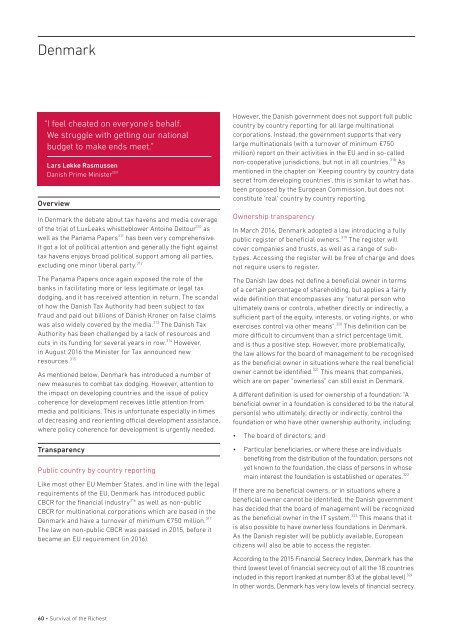You also want an ePaper? Increase the reach of your titles
YUMPU automatically turns print PDFs into web optimized ePapers that Google loves.
Denmark<br />
“I feel cheated on everyone's behalf.<br />
We struggle with getting our national<br />
budget to make ends meet.”<br />
Lars Løkke Rasmussen<br />
Danish Prime Minister 309<br />
Overview<br />
In Denmark <strong>the</strong> debate about tax havens and media coverage<br />
<strong>of</strong> <strong>the</strong> trial <strong>of</strong> LuxLeaks whistleblower Antoine Deltour 310 as<br />
well as <strong>the</strong> Panama Papers 311 has been very comprehensive.<br />
It got a lot <strong>of</strong> political attention and generally <strong>the</strong> fight against<br />
tax havens enjoys broad political support among all parties,<br />
excluding one minor liberal party. 312<br />
The Panama Papers once again exposed <strong>the</strong> role <strong>of</strong> <strong>the</strong><br />
banks in facilitating more or less legitimate or legal tax<br />
dodging, and it has received attention in return. The scandal<br />
<strong>of</strong> how <strong>the</strong> Danish Tax Authority had been subject to tax<br />
fraud and paid out billions <strong>of</strong> Danish Kroner on false claims<br />
was also widely covered by <strong>the</strong> media. 313 The Danish Tax<br />
Authority has been challenged by a lack <strong>of</strong> resources and<br />
cuts in its funding for several years in row. 314 However,<br />
in August 2016 <strong>the</strong> Minister for Tax announced new<br />
resources. 315<br />
As mentioned below, Denmark has introduced a number <strong>of</strong><br />
new measures to combat tax dodging. However, attention to<br />
<strong>the</strong> impact on developing countries and <strong>the</strong> issue <strong>of</strong> policy<br />
coherence for development receives little attention from<br />
media and politicians. This is unfortunate especially in times<br />
<strong>of</strong> decreasing and reorienting <strong>of</strong>ficial development assistance,<br />
where policy coherence for development is urgently needed.<br />
Transparency<br />
Public country by country reporting<br />
Like most o<strong>the</strong>r EU Member States, and in line with <strong>the</strong> legal<br />
requirements <strong>of</strong> <strong>the</strong> EU, Denmark has introduced public<br />
CBCR for <strong>the</strong> financial industry 316 as well as non-public<br />
CBCR for multinational corporations which are based in <strong>the</strong><br />
Denmark and have a turnover <strong>of</strong> minimum €750 million. 317<br />
The law on non-public CBCR was passed in 2015, before it<br />
became an EU requirement (in 2016).<br />
However, <strong>the</strong> Danish government does not support full public<br />
country by country reporting for all large multinational<br />
corporations. Instead, <strong>the</strong> government supports that very<br />
large multinationals (with a turnover <strong>of</strong> minimum €750<br />
million) report on <strong>the</strong>ir activities in <strong>the</strong> EU and in so-called<br />
non-cooperative jurisdictions, but not in all countries. 318 As<br />
mentioned in <strong>the</strong> chapter on 'Keeping country by country data<br />
secret from developing countries', this is similar to what has<br />
been proposed by <strong>the</strong> European Commission, but does not<br />
constitute ‘real’ country by country reporting.<br />
Ownership transparency<br />
In March 2016, Denmark adopted a law introducing a fully<br />
public register <strong>of</strong> beneficial owners. 319 The register will<br />
cover companies and trusts, as well as a range <strong>of</strong> subtypes.<br />
Accessing <strong>the</strong> register will be free <strong>of</strong> charge and does<br />
not require users to register.<br />
The Danish law does not define a beneficial owner in terms<br />
<strong>of</strong> a certain percentage <strong>of</strong> shareholding, but applies a fairly<br />
wide definition that encompasses any “natural person who<br />
ultimately owns or controls, whe<strong>the</strong>r directly or indirectly, a<br />
sufficient part <strong>of</strong> <strong>the</strong> equity, interests, or voting rights, or who<br />
exercises control via o<strong>the</strong>r means”. 320 This definition can be<br />
more difficult to circumvent than a strict percentage limit,<br />
and is thus a positive step. However, more problematically,<br />
<strong>the</strong> law allows for <strong>the</strong> board <strong>of</strong> management to be recognised<br />
as <strong>the</strong> beneficial owner in situations where <strong>the</strong> real beneficial<br />
owner cannot be identified. 321 This means that companies,<br />
which are on paper “ownerless” can still exist in Denmark.<br />
A different definition is used for ownership <strong>of</strong> a foundation: “A<br />
beneficial owner in a foundation is considered to be <strong>the</strong> natural<br />
person(s) who ultimately, directly or indirectly, control <strong>the</strong><br />
foundation or who have o<strong>the</strong>r ownership authority, including;<br />
• The board <strong>of</strong> directors; and<br />
• Particular beneficiaries, or where <strong>the</strong>se are individuals<br />
benefiting from <strong>the</strong> distribution <strong>of</strong> <strong>the</strong> foundation, persons not<br />
yet known to <strong>the</strong> foundation, <strong>the</strong> class <strong>of</strong> persons in whose<br />
main interest <strong>the</strong> foundation is established or operates. 322<br />
If <strong>the</strong>re are no beneficial owners, or in situations where a<br />
beneficial owner cannot be identified, <strong>the</strong> Danish government<br />
has decided that <strong>the</strong> board <strong>of</strong> management will be recognized<br />
as <strong>the</strong> beneficial owner in <strong>the</strong> IT system. 323 This means that it<br />
is also possible to have ownerless foundations in Denmark.<br />
As <strong>the</strong> Danish register will be publicly available, European<br />
citizens will also be able to access <strong>the</strong> register.<br />
According to <strong>the</strong> 2015 Financial Secrecy Index, Denmark has <strong>the</strong><br />
third lowest level <strong>of</strong> financial secrecy out <strong>of</strong> all <strong>the</strong> 18 countries<br />
included in this report (ranked at number 83 at <strong>the</strong> global level). 324<br />
In o<strong>the</strong>r words, Denmark has very low levels <strong>of</strong> financial secrecy.<br />
60 • <strong>Survival</strong> <strong>of</strong> <strong>the</strong> <strong>Richest</strong>


